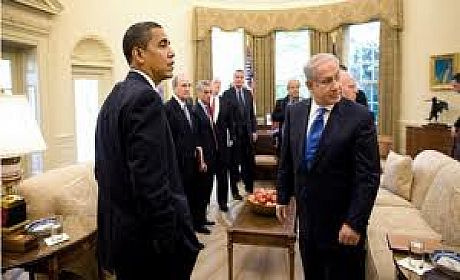Iran: Obama’s Main Concern in Meeting with Netanyahu

Six months after Obama’s visit to Israel where he attempted to improve his relations with Benjamin Netanyahu, the prime minister of this country, the US President and Netanyahu are faced with a big test which is considered as the most important challenge in the continuation of their cooperation.
According to Reuters, the diplomatic maneuver of Hassan Rohani, Iran’s President, has created a deep rift between the White House and Netanyahu’s administration and their reactions to this crisis will greatly affect their political legitimacy and future stability in the Middle East.
Netanyahu is set to meet the US President at the White House three days after the historic phone conversation between Rohani and Obama. The Monday meeting, based on the analysis of this British news agency, can be one of the most important meetings between Obama and Netanyahu. During recent months, they have always tried to show their unity but perhaps behind closed doors, their differences over the issue of Iran have reached a point where bridging over them in front of the cameras would be difficult.
While Netanyahu has asked Obama to set a deadline for Iran, the speed of the movement of the Iranian and US Presidents towards each other has been unprecedented during the past few days. Before leaving Tel Aviv airport for Washington, Netanyahu has said to reporters that the facts must be paid attention to amidst the sweet talks and attractive smiles. This is while Obama asks Netanyahu to give him time to evaluate Iran. On the other hand, the US President always attempt to assure Tel Aviv with regard to Iran and states that as long as no tangible step is seen from Iran, he will not take measures to lift sanctions. But sources in the White House say that Obama’s response to this demand of Netanyahu based on setting a timetable for Iran will still be negative.
A US official has stated in this regard that the US and Israeli officials will still reiterate in front of reporters that there is no rift between Tel Aviv and Washington with regard to Iran. But Rohani is an open window. On the other hand, some officials in Tel Aviv have doubts that, considering Obama’s refraining from launching a military attack against Syria, he would be willing to launch an air strike against Iran’s nuclear facilities in case of the failure of diplomacy. Elliott Abrams, the White House Middle East advisor to George W. Bush who now is active in the Council on Foreign Relations, says that it seems that all options are no longer on the table with regard to Iran.
But what makes relations between Obama and Netanyahu more complicated is the peace process between Israel and Palestine. This process has, once again, been revived due to John Kerry’s initiative. Some believe that Netanyahu in Washington and later in his speech at the UN General Assembly will not have a conciliatory tone.
Some analysts state that although Washington emphasizes that Tel Aviv will be informed about the developments made in its relations with Tehran, following the unprecedented phone conversation between the Iranian and US presidents, Netanyahu’s doubts have deepened. On the other hand, based on the importance of Israel’s lobby in the US, it seems that Obama’s capability to calm Netanyahu is limited.
International observers state that in his visit to Washington, Netanyahu seeks to receive the commitment that in case of the failure of diplomacy, Obama would enforce a credible military threat against Iran. Some believe that Netanyahu and Obama will talk about setting the red lines for Iran at least in their private meeting.
In his speech last year at the UN General Assembly, Netanyahu drew a red line on an image of a bomb. But it seems that he would not take a similar measure in his speech this year.

